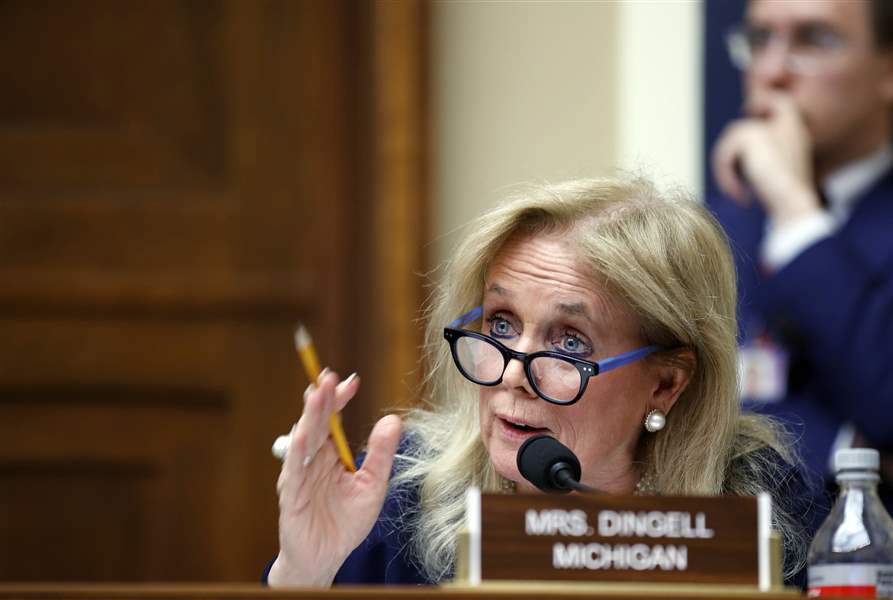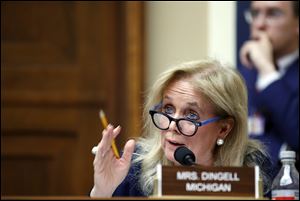
U.S. Rep. Dingell: I tried to sway Kasich to move faster on Lake Erie's impairment
5/2/2018
Rep. Debbie Dingell, D-Mich., questions Environmental Protection Agency Administrator Scott Pruitt as he testifies on the EPA's budget Thursday, April 26, 2018 in Washington.
ASSOCIATED PRESS
ANN ARBOR — U.S. Rep. Debbie Dingell (D., Dearborn) surprised a roomful of Great Lakes scientists and policy experts at the University of Michigan on Tuesday night by saying she made a personal appeal to Ohio Gov. John Kasich to designate western Lake Erie as impaired back when his administration had dug in its heels and refused to do so.
Ms. Dingell, wife of retired U.S. Rep. John Dingell, said she is a friend of Mr. Kasich’s and was hoping he would listen.
“He didn’t,” she said during her remarks as the event’s dinner speaker.

Rep. Debbie Dingell, D-Mich., questions Environmental Protection Agency Administrator Scott Pruitt as he testifies on the EPA's budget Thursday, April 26, 2018 in Washington.
Ms. Dingell said she told Mr. Kasich that Michigan Gov. Rick Snyder — who has come under fire for how he handled the Flint water crisis — did the right thing by declaring Michigan’s much smaller portion of the lake as impaired in 2016.
Both Mr. Kasich and Mr. Snyder are Republicans. Ms. Dingell said Mr. Kasich’s refusal to follow Michigan’s lead was making her state’s declaration meaningless, because pollution doesn’t stop at state borders.
Ms. Dingell said one of her best friends in Congress, U.S. Rep. Marcy Kaptur (D., Toledo), was surprised when she learned about the phone call. Ms. Dingell did not say when it was placed.
“Marcy said, ‘You're crazy. Why are you calling him?’”
The Kasich administration — after years of refusing to budge on the issue — joined Michigan in designating Ohio’s portion of western Lake Erie as impaired in March, committing Ohio to developing tougher runoff-control rules for farmers.
“But it took far too long for those state officials to make this decision,” Ms. Dingell said.

Ohio Gov. John Kasich
She thanked scientists in the room for their Lake Erie research, and received applause when she said this: “There's one thing that Michigan and Ohio should be able to agree on: It's the impairment of Lake Erie and the importance of reducing all pollution, including point and nonpoint source pollution.”
She began her talk by saying climate change and land-use issues have made toxic algae “a real and pressing issue everywhere, from the Great Lakes to the coast of Florida to the Chesapeake Bay to the Pacific coast of California and it requires our collective wisdom and attention.
“We don't need to reinvent,” Ms. Dingell said. “We need to learn from each other.”
She encouraged people to better understand the plight of farmers.
“We need to not demonize them,” Ms. Dingell said.
She also said she is proud to be part of a bipartisan coalition that has twice rejected Trump administration efforts to destroy the $300-million-a-year Great Lakes Restoration Initiative. The Trump administration tried to kill the Obama program last year, and proposed a 90 percent reduction in funding this year.
Both times, a mixture of Democrats and Republicans in the Great Lakes congressional delegation persuaded other members of Congress to join them in fully funding the program.
“It is the single most important program for keeping the Great Lakes clean,” Ms. Dingell said. “This is an issue that unifies all members around the Great Lakes.”
Contact Tom Henry at thenry@theblade.com, 419-724-6079, or via Twitter @ecowriterohio.